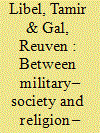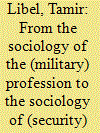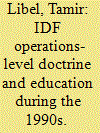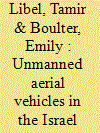|
|
|
Sort Order |
|
|
|
Items / Page
|
|
|
|
|
|
|
| Srl | Item |
| 1 |
ID:
140561


|
|
|
|
|
| Summary/Abstract |
The growing religiosity in the Israel Defense Forces (IDF) in recent years is discussed by employing the broader lens of changes to the organization's overall manpower. First, the authors will indicate the dynamic and changing make-up of those serving in the IDF, in terms of both the socio-demographic characteristics of conscripted soldiers, and the motivation of individuals enlisting in the IDF. Second, it is demonstrated how a window has opened in the IDF, especially in combat units and command roles, for a growth in religiosity as a result of the gradual increase in the number of conscripts affiliated with the Zionist national-religious population.
|
|
|
|
|
|
|
|
|
|
|
|
|
|
|
|
| 2 |
ID:
144728


|
|
|
|
|
| Summary/Abstract |
The paper’s main argument is that Israel’s security policy, which traditionally focused on defending its territorial integrity against regular Arab armed forces, was, by the 2010s, transformed into one that focuses on facing a variety of state- and non-state-based threats. Neo-realist explanations could neither account for the contested nature of the security debate during this period, nor the inconsistent evolution of the policy. The present study aims to solve this conundrum by introducing an alternative approach known as 4th generation strategic culture research. The paper is comprised of four parts. First, the origins and evolution of strategic culture are reviewed, with emphasis placed on the commonly accepted weaknesses that, to date, have prevented it from being used as a testable theoretical concept, and subsequently as an explanatory factor for security policy changes. The second part presents the “modernist constructivism” approach that bridges the gap between traditional constructivism and hypothesis-driven research design. Next, the paper introduces the emerging fourth generation in strategic culture literature, followed by a conceptual framework designed to resolve the inherent weaknesses of the more traditional approaches. Finally, this conceptual framework is applied to analyse the transformation of Israel’s security policy between 1982 and 2014.
|
|
|
|
|
|
|
|
|
|
|
|
|
|
|
|
| 3 |
ID:
166591


|
|
|
|
|
| Summary/Abstract |
Few would disagree that European militaries have experienced dramatic changes since the end of the Cold War. Much of the discussion on these changes to date has referred to the concept of professionalism. However, this approach became outdated as professions in post-industrialist societies entered a state of crisis as a result of growing competition from a variety of competitors. The present study adapts a new framework from the sociology of knowledge literature – sociology of expertise – into one, sociology of security expertise, which is suitable for study of contemporary armed forces. Its utility is demonstrated through analysis of five European professional military education institutions. The analysis shows that European military organisations are transiting, albeit in various degrees, from one form of social organisation of military knowledge production – associated with the military education model common to traditional military colleges – toward another, which is related to the military education model of national defence universities. Hence it is highly probable that European military organisations lose, either voluntary or unintentionally, their professional character and can no longer be unquestionably assumed to be military professions. Hence, they should be analysed hereafter using the sociology of security expertise framework.
|
|
|
|
|
|
|
|
|
|
|
|
|
|
|
|
| 4 |
ID:
099554


|
|
|
| 5 |
ID:
173421


|
|
|
|
|
| Summary/Abstract |
The strategic culture approach has been suffering from a prolonged theoretical stalemate, despite a surge in case studies, which culminated in the Johnston-Gray debate and subsequent schism. The present paper outlines a new approach designed to overcome this deadlock, and consists of three arguments. First, the three previous generations of strategic culture studies have failed to explain how strategic culture influences behaviour. Second, aligning strategic culture theory-building with discursive institutionalism offers a way to overcome this fundamental fallacy. Third, a research programme for strategic culture should draw on computational social science to enable it to present and test middle-range theories.
|
|
|
|
|
|
|
|
|
|
|
|
|
|
|
|
| 6 |
ID:
175449


|
|
|
|
|
| Summary/Abstract |
In spite of theoretical and methodological diversity, the three generations of the strategic culture literature failed to overcome the main challenge of the approach – to account for change in behavior – due to two fallacies: Conceptualizing strategic culture as homogenous on the national level and continuous on the temporal level. However, the recent emergence of fourth generation in the literature offers prospects for overcoming them. The article presents a new, falsifiable theoretical model that pursues this aim. Thus, it begins with discussion of the promise and pitfalls of the fourth generation. Next, the alignment of strategic culture with new institutionalism is explored. This is followed by an introduction of discursive institutionalism and its potential for advancing the fourth-generation theory building. Then, a new falsifiable fourth-generation discursive-institutionalist strategic culture model is presented. The concluding section discusses the operationalization of the model via network analysis using social data science methods.
|
|
|
|
|
|
|
|
|
|
|
|
|
|
|
|
| 7 |
ID:
137947


|
|
|
|
|
| Summary/Abstract |
The development of unmanned technology has led the Israeli Air Force (IAF) to be a leader in the establishment of unmanned aerial vehicle (UAV) squadrons. Tamir Libel and Emily Boulter trace the historical evolution of this capability and assess the possibility of unmanned technology becoming central to the Israeli armed forces, and the limitations that make such a change unlikely in the near future.
|
|
|
|
|
|
|
|
|
|
|
|
|
|
|
|
|
|
|
|
|